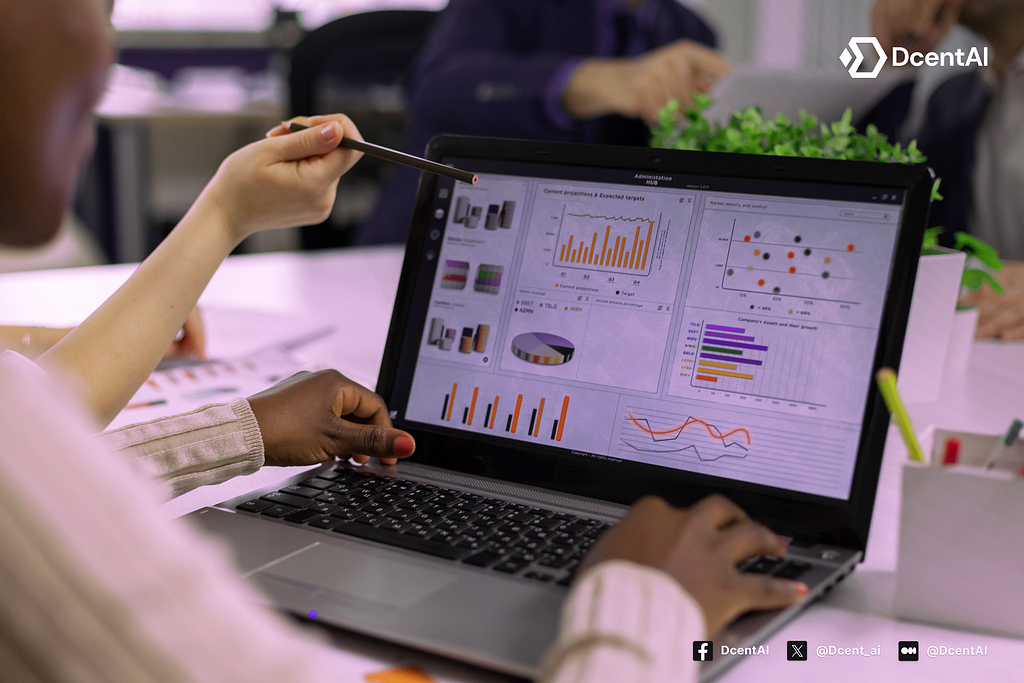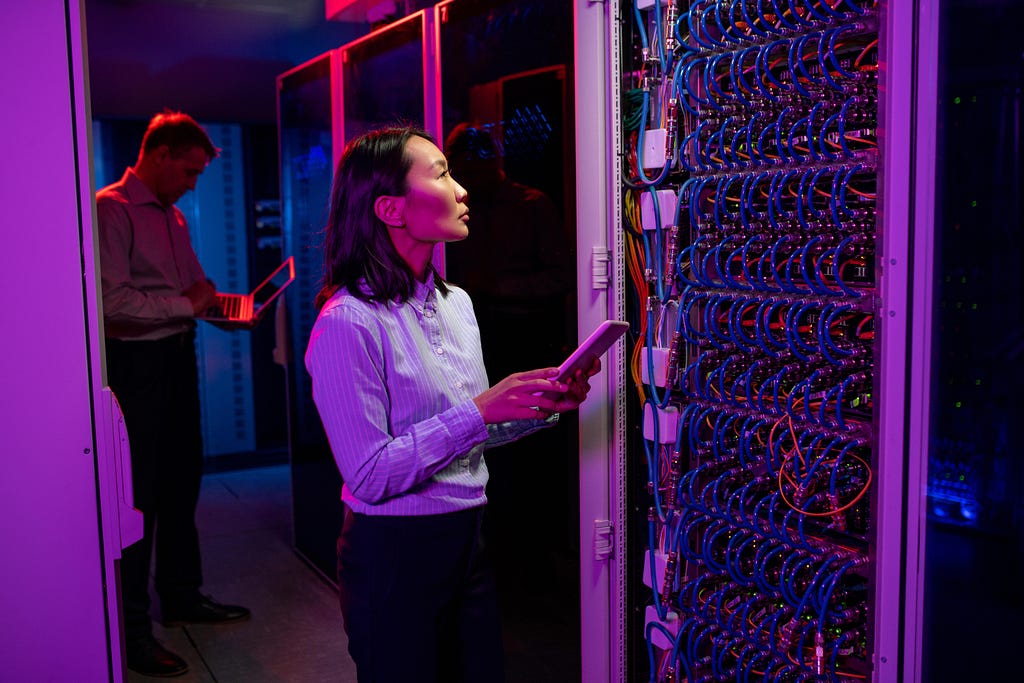Unlocking Asset Potential: Inside RealmAi’s Dynamic Fractionalization Mechanism

Data marketplaces are platforms that allow data providers and consumers to securely and efficiently exchange data. These marketplaces are critical for democratizing access to high-quality datasets, driving development, and encouraging informed industry decision-making.
Decentralization improves data marketplaces by guaranteeing information integrity, security, and transparency, moderating risks of data breaches and central point failures. It empowers users with control over their information and guarantees fair compensation.
DcentAI exemplifies this approach by providing a decentralized network for information sharing and monetization.It fosters belief and transparency, promoting equitable distribution of data-related benefits and driving a broader selection of decentralized information marketplaces.
In this article, we will explore the significance of data marketplaces, the role of decentralization in data sharing, and how platforms like DcentAI are revolutionizing data trade and monetization.
Structure of Decentralized Data MarketplacesHere’s the structure and comparison of decentralized data marketplaces over the traditional ones:
Components and ArchitectureDecentralized data marketplaces have a particular structure centered on information providers and users. These providers, which can be individuals, businesses, or sensors, make money by offering their information within the marketplace. Customers, including businesses and researchers, utilize information to get insights and train AI models. These marketplaces are built on blockchain technology, which guarantees information integrity and transparency through permanent records and keen contracts. A user-friendly interface supports consistent browsing, acquiring, and offering of data, including transaction tracking and information management capabilities.
Comparison with Traditional Data MarketplacesThere are differences between decentralized data marketplaces and traditional ones. Traditional marketplaces depend on centralized authorities for exchange operations, leading to bottlenecks, advanced costs, and vulnerabilities. In contrast, decentralized marketplaces operate on distributed networks, eliminating central authorities and associated risks. Security and trust are enhanced in decentralized models through blockchain and encryption, empowering users with more data control and system transparency.
Efficiency and cost benefits arise from reduced intermediaries, facilitated by smart contracts and automated processes, speeding up transactions and lowering fees. Data providers in decentralized marketplaces, like those enabled by DcentAI, retain greater control over data usage terms and receive fair compensation through incentivized mechanisms, promoting equitable value distribution. Decentralized data marketplaces leverage blockchain and smart contracts to foster a more secure, efficient, and transparent data economy compared to traditional models.
Benefits of Decentralized Data Marketplaces
Here are the benefits of decentralized data marketplaces:
Data Privacy and SecurityDecentralized data marketplaces provide greater privacy and security than the centralized alternatives. It depends on a single server; centralized marketplaces constantly face data breaches and unauthorized access issues. On the other hand, decentralized frameworks use blockchain technology to upgrade security. Transactions are recorded on immutable ledgers, which guarantees information integrity and prevents altering. Data is dispersed throughout a network of nodes, making it sensitive for attackers to compromise the whole dataset without entering numerous nodes at a time. Encryption adds protection by making data unreadable without decryption keys. Networks like DcentAI use these technologies to provide consumers with strong data protection, promoting trust in the marketplace’s security and transparency.
Democratization of Data AccessDecentralized data marketplaces democratize data access by breaking down barriers prevalent in traditional markets. Unlike centralized counterparts that often restrict access to large organizations, decentralized platforms offer inclusive participation. Anyone with valuable data can become a provider, while diverse consumers can purchase and utilize data directly, bypassing intermediaries. Smart contracts ensure transparent and efficient transactions, fairly compensating providers and delivering data promptly. Data tokens enable fractional ownership, making valuable datasets accessible even to smaller entities. DcentAI exemplifies this democratization by facilitating direct engagement between providers and consumers, nurturing a diverse and dynamic data ecosystem.
Challenges and Solutions in Decentralized Data MarketplacesHere are the challenges and solutions in decentralized data marketplaces:
Data Quality AssuranceEnsuring high data quality in decentralized data marketplaces is complex due to diverse data sources and potential inaccuracies without centralized control. To address this, platforms implement reputation systems to rate providers based on reliability. Automated validation tools scan datasets for errors pre-listing, while decentralized autonomous organizations (DAOs) establish and enforce quality standards through community-driven governance. DcentAI integrates these tools and governance models to uphold data quality effectively.
Regulatory ComplianceNavigating regulatory compliance in decentralized data marketplaces is intricate due to divergent data protection laws across regions. Ensuring adherence to these regulations poses challenges without centralized oversight. Decentralized platforms manage compliance by embedding protocols into smart contracts to automate legal processes. Regulatory nodes oversee compliance within the marketplace, complemented by educational resources and guidelines for participants. Collaborations with legal advisors keep platforms abreast of regulatory changes. DcentAI integrates these measures to ensure secure and compliant data transactions.
Case Studies And Examples of Decentralized Data Marketplaces
Here are some real-world examples of decentralized data marketplaces:
Ocean ProtocolOcean Protocol is a decentralized data exchange protocol that unlocks data for AI applications. It empowers data owners to monetize their data while retaining control and privacy. Ocean Protocol uses blockchain technology to guarantee transparent and secure transactions. Data is tokenized into data tokens, which can be exchanged on the Ocean Market. By empowering secure and privacy-conserving data sharing, Ocean Protocol encourages the development of AI and machine learning models that need huge datasets. It democratizes access to data, permitting small and medium-sized enterprises( SMEs) to participate in the AI economy.
DcentAIDcentAI is a decentralized network that provides GPU and storage resources to AI businesses. It also enables secure data sharing and monetization. It can integrate decentralized data marketplaces into its platform, allowing users to securely share and monetize their data. DcentAI uses blockchain technology to ensure that data transactions are transparent and tamper-proof. It implements a decentralized architecture to improve the accessibility of AI resources. It promotes AI research and development by providing more entities access to high-quality data and computational capacity.
DatumDatum is a decentralized marketplace permitting individuals to monetize their data. It provides consumers with a platform to manage and choose who can access their data. Datum utilizes blockchain innovation to encourage a secure and transparent data trade. Users can upload data to the Datum network, which is encrypted and stored. Data buyers can use Datum tokens to gain access to this information. It empowers users by granting them control over their particular data and the ability to benefit from it. This strategy alters the power dynamic in data exchange, boosting user autonomy and privacy.
StreamrStreamr is a platform that allows decentralized real-time data sharing and monetization. It specializes in IoT and sensor data, making it easy to stream and exchange data. Blockchain technology ensures that data transactions are secure and transparent. Data can be bought and sold instantly using the platform’s token, DATA token. This platform makes it easier to share and profit from real-time data, which is especially useful for IoT applications. It also makes real-time data more accessible, encouraging innovation in areas like smart cities and self-driving vehicles.
In SummaryDecentralized data marketplaces provide a progressive way to share data and monetization, relying on blockchain technology to guarantee security, privacy, and transparency. These marketplaces democratize access to important datasets by permitting data possessors to hold control and effectively monetize them, driving innovation across numerous industries.
Networks like DcentAI, Ocean Protocol, Datum, and Streamr illustrate how decentralized networks can enhance data security, democratize data access, and enable real-time data trade.Despite challenges similar to ensuring data quality and nonsupervisory compliance, decentralized data marketplaces’ ongoing development and adoption promise to reshape the data economy, making it more equitable and effective. As these platforms continue to evolve, they will probably play a pivotal part in unleashing the full potential of data in the digital age.
To learn more about DcentAI, visit our Facebook and X accounts.Become a pioneer of DcentAI community!Decentralized Data Marketplaces: Facilitating Data Sharing and Monetization was originally published in Coinmonks on Medium, where people are continuing the conversation by highlighting and responding to this story.
